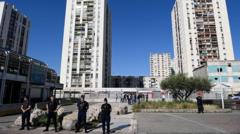Authorities in Nîmes have recently enacted a nighttime curfew aimed at safeguarding local youth from the violent repercussions of rampant drug trafficking. This decision follows reports of multiple violent incidents, including a broad daylight shooting that resulted in one fatality and numerous injuries. Local officials assert that the curfew, set between 9:00 PM and 6:00 AM, is necessary to mitigate exposure to violence among individuals under 16 years old and to curb escalating tensions caused by drug-related crime.
The mayor of Nîmes, Jean-Paul Fournier, described the current situation as "untenable," attributing the increasing climate of fear to drug traffickers. Deputy mayor Richard Schieven echoed these sentiments, highlighting the need to protect not only minors uninvolved in illicit activities but also younger children, some as young as 12 and 13, who are often victimized by drug gangs.
Béziers, located approximately 120 kilometers southwest of Nîmes, has already enforced a curfew for children under 13 since last year, which was extended to those under 15 in certain troubled areas. Mayor Robert Ménard pointed out that no child should be wandering the streets alone at late hours, as it breeds mischief. Nevertheless, ongoing violence persists in the region, exemplified by recent media reports of youths ambushing police with fireworks.
Limoges has faced similar challenges in enforcing curfews aimed at youth. Following disturbances involving around 100 individuals, Mayor Émile Roger Lombertie acknowledged the ineffectiveness of the curfew measures, stating that the failure to apprehend the culprits questions their enforcement capabilities.
The situation in Nîmes echoes a tragic memory from two years past when a 10-year-old boy was fatally caught in a gang-related shooting. The concerning rise in drug violence is no longer confined to Marseille, historically known as the epicenter of gang conflicts in France.
Current figures from the interior ministry reveal that in 2024 alone, 110 people lost their lives, and over 300 were injured due to drug-related violence. Interior Minister Gérard Darmanin and Justice Minister Bruno Retailleau are staunch advocates for combating the drug trade. Earlier this year, they successfully passed legislation to enable construction of new maximum-security prisons for major drug offenders, create a dedicated prosecutorial unit, and extend investigative powers alongside enhanced protections for informers.
A recent update from Darmanin indicated that 17 of the most dangerous drug traffickers had been transferred to a high-security facility in Vendin-le-Vieil, situated in northern France. The severe police response and government crackdown have also resulted in a wave of retaliatory violence against authorities, marking a troubling time in the ongoing battle against drug-related crime in France.
The mayor of Nîmes, Jean-Paul Fournier, described the current situation as "untenable," attributing the increasing climate of fear to drug traffickers. Deputy mayor Richard Schieven echoed these sentiments, highlighting the need to protect not only minors uninvolved in illicit activities but also younger children, some as young as 12 and 13, who are often victimized by drug gangs.
Béziers, located approximately 120 kilometers southwest of Nîmes, has already enforced a curfew for children under 13 since last year, which was extended to those under 15 in certain troubled areas. Mayor Robert Ménard pointed out that no child should be wandering the streets alone at late hours, as it breeds mischief. Nevertheless, ongoing violence persists in the region, exemplified by recent media reports of youths ambushing police with fireworks.
Limoges has faced similar challenges in enforcing curfews aimed at youth. Following disturbances involving around 100 individuals, Mayor Émile Roger Lombertie acknowledged the ineffectiveness of the curfew measures, stating that the failure to apprehend the culprits questions their enforcement capabilities.
The situation in Nîmes echoes a tragic memory from two years past when a 10-year-old boy was fatally caught in a gang-related shooting. The concerning rise in drug violence is no longer confined to Marseille, historically known as the epicenter of gang conflicts in France.
Current figures from the interior ministry reveal that in 2024 alone, 110 people lost their lives, and over 300 were injured due to drug-related violence. Interior Minister Gérard Darmanin and Justice Minister Bruno Retailleau are staunch advocates for combating the drug trade. Earlier this year, they successfully passed legislation to enable construction of new maximum-security prisons for major drug offenders, create a dedicated prosecutorial unit, and extend investigative powers alongside enhanced protections for informers.
A recent update from Darmanin indicated that 17 of the most dangerous drug traffickers had been transferred to a high-security facility in Vendin-le-Vieil, situated in northern France. The severe police response and government crackdown have also resulted in a wave of retaliatory violence against authorities, marking a troubling time in the ongoing battle against drug-related crime in France.

















